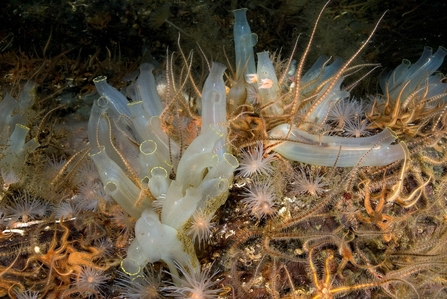
Sea squirts and brittle stars are among the marine wildlife in the Irish Sea that need protection © Paul Naylor

Sea squirts and brittle stars are among the marine wildlife in the Irish Sea that need protection © Paul Naylor
By removing all pressures and damaging activities, HPMAs will give parts of our sea the best opportunity to recover to as natural and healthy condition as possible.Dr Emily BaxterSenior Marine Conservation Officer, North West Wildlife Trusts
The Benyon review of Highly Protected Marine Areas (HPMAs) has been published by Defra. We back its recommendations that HPMAs should be an essential part of the UK network for protection and recovery of the marine environment, and the Government should introduce HPMAs within existing protected areas.
The review was published on World Oceans Day (8 June) by an independent panel of members from academia, industry and conservation backgrounds and chaired by former MP and Fisheries Minister Richard Benyon. We believe that there is an overwhelming case for HPMAs across our seas which would see a ban on all damaging activities and are calling for an ambitious HPMA delivery plan within a year.
The North West Wildlife Trust’s Senior Marine Conservation Officer, Dr Emily Baxter, says: “Our seas are becoming increasingly threatened by pollution, unsustainable exploitation such as overfishing and development at sea, and, increasingly, the effects of global climate change. These pressures are altering the ecological balance, depleting resources beyond safe biological limits and jeopardising what we can take from the sea. Our seas need to recover and this will require swift action to be taken.
“Today’s report proposes one of the vital steps needed towards the recovery. We urge the Government to take on board the recommendations and commit to a HPMA recovery plan before World Oceans Day 2021.
Emily says: “Existing Marine Protected Areas like Allonby Bay and Cumbria Coast Marine Conservation Zones are limited in their ability to restore habitats and marine life, as their remit of these sites is to maintain these habitats in their current condition. In these areas, only some of the most damaging activities are prevented, and only in some parts of the site.”
“Importantly, today’s report recommends that Highly Protected Marine Areas should allow the protection and recovery of marine ecosystems by prohibiting extraction, destruction and deposition, and only allowing non-damaging levels of other activities to occur. It also highlights that these areas should protect all species and habitats within their boundaries – allowing nature to recover properly.
“Another important recommendation is that HPMAs should be designated in all areas of English Seas, both inshore and offshore, covering a range of habitats. Over the next year we will be working hard to ensure that important areas off the Cumbrian coast and further offshore in the Irish Sea receive full consideration based on robust ecological evidence. We will also be encouraging HPMAs to be monitored closely, to allow us to understand what a thriving seabed and restored marine ecosystem really means.”
In October 2019 The Wildlife Trusts submitted evidence to the panel saying:
The designation of HPMAs would be the first of their kind in the UK and the ‘gold standard’ of environmental protection. HPMAs can act as an ecosystem tool for recovery and significantly contribute to the Government’s aim of achieving a well-managed and ecologically coherent network of protected areas at sea.
Emily continues: “By removing all pressures and damaging activities, HPMAs will give parts of our sea the best opportunity to recover to as natural and healthy condition as possible.”
Just over a year ago, the Government announced the creation of six new Marine Conservation Zones in the Irish Sea, including two off Cumbria: the Solway Firth and West of Copeland. All six of these sites contain vulnerable or rare habitats and species in urgent need of recovery to a healthier ecological condition, after years of suffering from damaging human activities.
Whilst the designation of these sites was a significant step towards the UK achieving an ‘ecologically coherent’ network of Marine Protected Areas, management measures are yet to be implemented in these sites to prevent further damage and destruction. The management of existing Marine Protected Areas and the introduction of well-enforced Highly Protected Marine Areas (offering the highest standard of environmental protection) is urgently needed if we are to see the recovery of marine life un our seas.
We are asking everyone to take one simple action this World Oceans Day, to support us in our ask to Government for an ambitious delivery plan for Highly Protected Marine Areas within a year. Raise your hand and make a difference through our quick and easy e-action now.